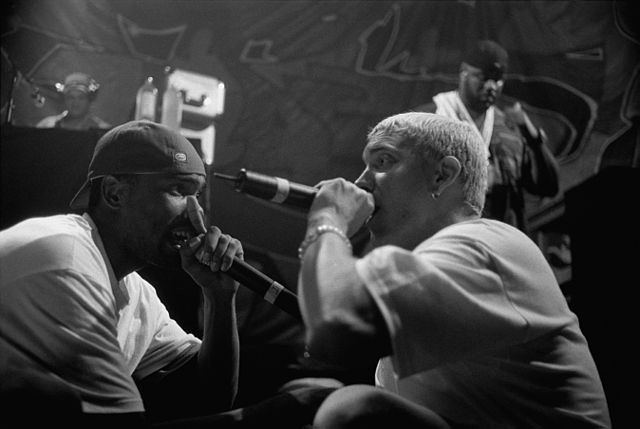TRUTH MATTERS… Donate to support excellence in student journalism
“Gen Z is trying to cancel Eminem!”
This simple statement has sparked a heated debate between Millennials and Gen Z across social media platforms.
Every generation has its battles; Baby Boomers criticize Gen X for experiencing war while Gen Z clashes with Millennials’ over style, music and attitudes toward society.
The current battle between Millennials and Gen Z over rapper Eminem is unique because its origins are unclear.
Many videos on TikTok feature Millennials labeling Gen Z as a soft generation which is where the Eminem feud comes into play.
A common talking point in generational battles is that younger generations are perceived as being softer or obsessed with cancel culture.
When news of Eminem’s musical comeback surfaced it quickly spread on TikTok. Many Gen Z users made videos calling him cringe or criticizing his music as just plain bad. Many of these videos were misunderstood when they reached Millennials on TikTok.
In response, many Millennials made TikToks claiming that Gen Z wanted to cancel Eminem, merely because of his shock value lyrics.
One well-known example of this is a TikTok by Cassie Smith who criticized Gen Z for trying to cancel Eminem.
Smith, a popular TikToker, often discusses the differences between Gen Z and Millennials, usually portraying Gen Z negatively.
Her most famous video is a diss track on Gen Z for their alleged attempt to cancel Eminem.
This video went viral, with many Millennials defending and agreeing with Smith.
Many Gen Z users responded to her video calling it cringeworthy.
This is not the first, nor will it be the last time that Gen Z and Millennials clash online.
These disputes happen frequently on social media, though usually on a smaller scale.
Gen Z and Millennials could not be more different.
While Gen Z may not make as many videos criticizing Millennials there are still quite a few on apps like X and TikTok Gen Z.
Users frequently post video essays about Millennials behavior, often calling it borderline humiliating. Despite being close in age and having similar childhood experiences the divide between these generations is evident.
One significant difference is that Millennials grew into social media, while Gen Z has never known a world without it.
Often called the digital generation, Gen Z has the biggest online presence and serves as the rule makers of social media. Their dominance allows them to dictate what is considered “cringe” often upsetting Millennials.
The fight between the two generations highlights the evolving nature of music and trends.
Rather than fighting over these differences it is important to celebrate each generation’s unique connection to social media, and its influence on music, movies and TV.
This article originally appeared in the Fall 2024 print edition.






Tim • Dec 24, 2024 at 6:36 pm
Very respectful take on Eminem. Much love. Fellow millennial here. Born in 92. Been Eminem fan since 99